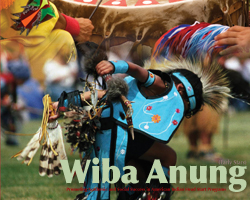Promoting Academic and Social Success in American Indian Head Start Programs
- Hope Gerde, Ph.D.
- Assistant Professor
- Department of Family and Child Ecology
- College of Social Science
American Indian children face many challenges, beginning at a very young age. In 2006 Michigan State University entered into a long-term partnership called Wiba Anung (Early Stars) to help tackle some of those challenges for all children enrolled in Michigan-based American Indian Head Start/Early Head Start programs.
According to 2000 U.S. Census data more than 25 percent of American Indians/Alaska Natives live in poverty. Children are at risk for arriving at kindergarten without the social and language skills necessary for success. Data from a study of 20 Michigan Tribal Head Start classrooms show children score significantly below the national average for letter knowledge, number identification, counting, and writing. And Head Start education coordinators report that their greatest challenge is to find or develop cultural and bilingual curricula.
Hope Gerde, assistant professor in the Department of Family and Child Ecology, is an early childhood specialist on the project. Her research focuses on how teachers' classroom practice supports children's language and literacy development during preschool and how well-designed professional development opportunities can enhance teachers' interactions with children.

A professional development program that Gerde designed for the American Indian Head Start teachers uses a technology-based distance learning model to reach teachers in geographically remote and isolated areas of Michigan. In this model, teachers record their classroom practice and upload video to a personal web page. An expert coach provides individualized feedback to teachers on this web page. The web page becomes a living document where teachers can view their videos and read constructive feedback for improving their interactions with the children in their classroom. Teachers of varying levels of technological savvy are successfully engaging in this professional development program.
Project Partners and Community Participation
"The Wiba Anung partnership is designed to build children's academic skills, build staff teaching skills, and integrate American Indian culture throughout the tribal Head Start system in Michigan," Gerde said. "Those goals look immense, until you consider the involvement of so many partners dedicated to this effort."
Along with Dr. Gerde and the Department of Family and Child Ecology, MSU partners include University Outreach and Engagement; the Native American Institute; the Department of Community, Agriculture, Recreation, and Resource Studies (CARRS); and the Department of Psychology.
Community partners include the Inter-Tribal Council of Michigan, Bay Mills Community College, Sault Ste. Marie Tribe of Chippewa Indians Head Start, and the Grand Traverse Band of Ottawa and Chippewa Indians Head Start.
A 25-person Wiba Anung Research Advisory Team, consisting primarily of tribal members, oversees all facets of program development and policy recommendations. There is also a Research Advisory Team, a Cultural Competence Advisory Team, and a Core Research Team. Findings are shared with the Head Start Parent Council and Head Start directors. Continual communication has led to deeper understanding of tribal culture, as well as parent and community strengths, needs, and priorities.
University and Community Partners in the Co-Creative Process
The partnership has become a model for university-community partnerships working with tribal Head Start programs throughout the United States. It is based on an approach to system change that is referred to as community-based participatory evaluation. This means all aspects of the project involve a co-creative process between the American Indian community partners and the university faculty and researchers.
"Our teachers are receiving tailored mentoring through a digital media system. Because they are located all throughout Michigan, this is a tremendous benefit. And because this partnership has been so meaningful and productive, it has opened the door for further partnerships with Michigan State University," said Sharon L. Teeple, executive director of the Inter-Tribal Council of Michigan.
Anne Suggitt is the manager of the Sault Ste. Marie Tribe of Chippewa Indians Early Childhood Programs, which include Head Start, Early Head Start, and Child Care. "The center directors, teachers, parents, and MSU faculty and researchers have worked together to develop a research agenda that is focused on helping us provide the highest quality early childhood education services to our children," said Suggitt. "We are excited about the professional development program we have developed, and we are in the process of working together to develop a cultural curriculum for tribal children in Michigan to explore their ancestry and practice their traditions using a curriculum that is reflective of the Native American way of life."
MSU graduate and undergraduate students are also part of the partnership, which is teaching them community based participatory research skills as well as giving them experience in civic engagement.
Dr. Gerde is enthusiastic about the project's goals, as well as the structure in place to accomplish those goals. "I'm honored to participate in a project that addresses a community-defined need, collaborates with a variety of partners, and includes strategies and solutions anchored in scholarship. It is a solid example of university-community partnerships at Michigan State University."
- Written by Carla Hills, University Outreach and Engagement